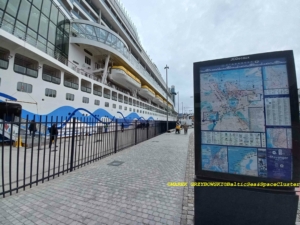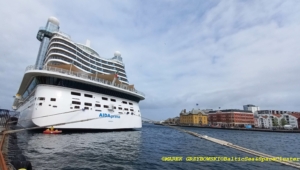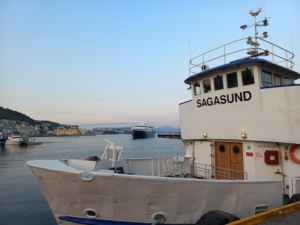|
|
|
|


By Marek Grzybowski
The first information from tour operators confirms that in 2023 the number of passengers on cruise ships increased to 106% compared to the level in 2019. Approximately 31.5 million sea tourists chose passenger ships – estimates the Cruise Lines International Association (CLIA).
This means a higher growth rate of sea tourists than the estimated growth rate of international tourism. UNWTO (United Nations World Tourism Organization) estimated that the number of international tourists in 2023 will reach from 80% to 95% of the pre-pandemic level in 2020. At the beginning of 2023, UNWTO reported on its website about a 20% decline in bookings on a global scale.
CLIA brings together 53 cruise ship operators, including 43 ocean ship owners (28 global and 15 regional) with 293 ships. CLIA also includes 10 river cruise operators. There are 3 global companies and 7 regional shipowners with 194 ships. Nearly 300 active partners supporting tour operators and approximately 75,000 cooperate with the organization. companies from the tourism industry, including approximately 15 thousand agencies and 60 thousand travel agents.
These numbers make you realize how many entities make their living from tourism and how many institutions must operate for maritime tourism to develop efficiently. A whole lot of people work to ensure that the passenger reaches the ship safely, spends time on board and in the port, and disembarks the ship safely.
Sea passenger is a business at sea and in port
It has been calculated that, globally, the maritime passenger tourism business provides a living for 848,000 people. jobs, the revenues of countries where this business is developing reach USD 75 billion. The main beneficiary is the United States of America. Europe receives approximately USD 44 billion thanks to maritime tourism, and thanks to the industry serving maritime tourists, we have 315,000. jobs.
The rest of the world generates revenues from marine tourism of USD 11 million and provides 411,000. jobs – calculated by CLIA experts over a year ago (CLIA 2021 Economic Impact Study, Oxford Economics. 2022 (Economic Impact results to be released in September 2023). To put it illustratively, 24 passengers on a passenger ship generate on average one job.
Sea tourists return to ships repeating cruises or choosing new destinations. This proves good for passenger ship operators who are able to create regular customers. During research conducted a year ago, more than 6 out of 10 people (63%) who decided to take a cruise were passengers who returned to the connection they chose for the first time.
They often go on a trip with the same shipowner or even the same cruise ship. It is mainly millennials (68%) and Generation X (86%) who decide to travel again, and to a slightly lesser extent baby boomers (82%) and Generation Z (78%).

Cruise operators are investing
Cruise operators do not skimp on investments, and their expenditure on services and new production is significant and constitutes a significant impetus for economic development. An impulse that is particularly important during the economic slowdown in leading markets.
More than a year ago, purchases by passenger ship operators in Europe alone were estimated at approximately EUR 5 billion. Globally, it was over USD 35.37 billion. Around EUR 720 million was spent by passengers on board and disembarking in European ports. Globally, passengers spent over $1.9 billion in ports and on ships.
Over EUR 10.5 billion was allocated for new contracts over a year ago. Passenger ships with a contract value of over USD 13 billion were built in shipyards around the world. More than EUR 1.3 billion was spent on the wages of crews and land staff of cruise ship owners. Crews and personnel of operators around the world cost more than $5 billion during the year.
New investments also mean choosing a course for ecology. Many passengers choose cruises on ships that are environmentally friendly, not only on the water and in the air. There are those who pay attention not to harm marine fauna and flora.
LNG and electricity from the quay FIRST
So cruise operators are on a decarbonization course. They use progress and introduce new technologies on ships and in the infrastructure of passenger ports. The ships are equipped with new efficient engines and less noisy systems. Most large operators choose engines powered by gas from LNG systems.
Many claim that these are temporary solutions and new generations of cruise ships will be powered by ecological fuels from renewable sources. Therefore, bioLNG and renewable synthetic LNG are treated as a solution for today and the next few years.
The shipowner’s organization announces that “75% of CLIA’s cruise ship fleet will be able to use renewable fuels once they become available on a large scale.” It has already been announced, based on the analysis of the order portfolio placed in shipyards, that 60% of ships that are to enter into service in 2023–2028 will be based on power plants with LNG systems as the main power supply system.
LNG bunkering and energy supplies from the quay are necessary
New ships in the service also requires investments in infrastructure. Firstly, the ports’ potential for LNG bunkering must increase. And secondly, ports will compete in their ability to provide electricity to passenger ships from the quay.
CLIA wants to be the leader in organizing cruises in responsible tourism. “By 2028, the number of CLIA member cruise ships equipped with shore power will more than double,” the organization announces.
Operators associated with CLIA announce that “Emissions of harmful substances will be reduced by 99%.” The goals are ambitious. It is planned to reduce greenhouse gas emissions by over 20%, SOx by 99%, soot emissions by 98% and NOx by 85%. The forecasts are based on technical analyzes of the 2021 order portfolio for new ships.
“Every CLIA member ship currently under construction by 2028, with the exception of expedition vessels, is to be equipped with shore-power capabilities,” CLIA announces. Today, 30% of CLIA shipowners’ ships, corresponding to 40% of GT, have systems for connecting to land energy sources.
30% of passenger ships plan to install connections during their modernization. The collected data shows that 29 cruise ports around the world have at least one shore-powered quay. It is known that another 20 ports will join this group in a short time.
Changes in passenger ship construction technologies have made it possible not only to serve an increasing number of passengers, but also to introduce all kinds of entertainment and services on ships. New technologies have made cruises more and more environmentally friendly, which is also appreciated by passengers. And this is also one of the important elements of building a competitive advantage.
Interested in more reading and listening recommendations? Keep the content coming.
AI continues to grow exponentially and so does BCGers’ interest in it. These books recommended by business leaders highlight how we can use it effectively and responsibly.

The Equality Machine
“The Equality Machine is basically an optimistic point of view on how we can use digital and AI to make the world more inclusive. It provides a good counter-point to a lot of doom and gloom.”
Amanda Luther
Managing Director & Partner

AI 2041: Ten Visions for Our Future
“New digital technologies such as AI, GenAI, augmented/mixed/virtual realities are expanding the art of the possible. We now need to build these possibilities into existence. This book provides the necessary inspiration.”
Tolu Oyekan
Managing Director & Partner
Naturally, BCGers are still very much concerned with our warming planet. This book and podcast give a picture of how we can help stop global warming and how it came to be.
This recommended book gives the long view of the trend toward deglobalization.
As diversity, equity, and inclusion work continues, it is essential to keep learning. This BCGer recommendation offers a creative perspective.
A new category this year, it allows BCGers to recommend books that shine a light on what it means to be human in a complicated world.

Origin Story: A Big History of Everything
“This book tells the story of the entire universe (the ‘big history’) through the lens of multiple disciplines including astrophysics, anthropology, and biology, and more. It is a fascinating, insightful, and accessible read that helps us understand the past and change your perspective on the future.”
Magalie Aoun
Associate, CEO Ambassador

Far From the Tree: Parents, Children and the Search for Identity
“After interviewing 300+ families, in this seminal book, Solomon explores the lives and communities of people with a variety of horizontal identities (traits not typically passed down vertically from parents such as deafness, dwarfism, autism, and often treated as flaws). The stories of how being different is a quality, not a deficiency, are incredibly moving —as are the countless examples of caregivers and communities transcending prejudice and hardship with love.”
Nadjia Yousif
Managing Director & Partner, Chief Diversity Officer
Inspired by a paper recently released by the Macdonald-Laurier Institute (20230831_Artificial-Intelligence-Cross_PAPER.pdf (macdonaldlaurier.ca), ATINER would like to organize a roundtable discussion on “Artificial Intelligence and Labor Market Effects“. This roundtable discussion will be organized by ATINER’s Business, Economics and Law Division (www.atiner.gr/blrd) (Director: Dr. Michael P. Malloy, Distinguished Professor & Scholar, University of the Pacific, USA) as part of the 17th Annual International Conference on Global Studies: Business, Economic, Political, Social and Cultural Aspects (18-21 December 2023), Athens, Greece (www.atiner.gr/cbc).
Dr. Gregory T. Papanikos, President, Athens Institute for Education and Research (ATINER)
Artificial intelligence (AI) is emerging as the most discussed technological, social, and economic phenomenon of 2023. But many people are concerned that if it proves to be an improvement over human intelligence, AI will significantly reduce the demand for labour, especially for middle-class jobs.
This paper looks at the possible economic impacts of AI. It makes no attempt to forecast how AI will evolve and does not address broader concerns about whether
the capabilities of AI will outrun the ability of humans to understand and manage this technology. Rather, it examines the economic impact of AI so far and compares its evolution with past forecasts of how technological change would affect workers. It cautions against a rush to increase government regulations and spending based on as yet unfounded concerns about the impact of AI on jobs.
Machine automation has been feared for its impact on human jobs since the Industrial Revolution began. Earlier eras of automation disrupted employment patterns in farming and factories, but overall job growth actually accelerated as higher incomes drove the expansion of other industries. Despite that experience, there are numerous forecasts that the deployment of AI will lead to widespread job losses.
Compounding the anxiety of potential job losses is the fear that AI will displace middle-class jobs and that the rewards from the widespread deployment of AI will accrue to a small number of people who own the capital and will thereby increase inequality.
The reality is that recent developments in the labour market are the exact opposite of these gloomy predictions. Employment rates are at an all-time high. The main difficulty of employers is finding workers in a labour market where unemployment is near historic lows. While AI technology was predicted to be a unique threat to white collar jobs, white collar employment in Canada, the US, and Britain continues to increase steadily. This raises the possibility that AI will be deployed to help workers do their jobs better – not to get rid of employees.
More: Philip Cross, “Artificial Intelligence”
By Marek Grzybowski
An ESG guidance for shipping was published this summer,. The implementation of an ESG strategy in shipping has implications throughout the ship supply and operation chain, from design through manufacturing, operation and port service.
The guide, developed jointly by Mærsk Mc-Kinney Møller Center for Zero Carbon Shipping experts together with Boston Consulting Group analysts, is intended to help companies operating in maritime transport implement comprehensive ESG (Environmental, Social and Governance) strategies. The essence of ESG was explained during a special webinar by Tanja Dalgaard, Chief Strategy & Operations Officer, Anne Katrine Bjerregaard Head of Strategy & Sustainability Office, Mikkel Krogsgaard Managing Director & Partner, BCG Peter Jameson Partner, BCG.
– In the world of maritime business, as in other industries, ESG reporting covers topics such as recycling, greenhouse gas emissions, other types of air pollution, environmental impact, business ethics, employee health and safety, as well as safety management and prevention accidents, explain DNV experts.
Remi Eriksen, Group President and CEO, DNV and Knut Ørbeck-Nilssen, CEO of DNV GL, pointed out the need for a comprehensive approach to the implementation of the ESG strategy during the presentation of the “Energy Transition Outlook 2023” and “Maritime safety trends” reports during Nor Shipping 2023.
ESG sets standards
According to DNV, ESG reports and sustainability reports are intended to reveal the achievement of parameters in all three areas that are important for the functioning of a modern company. Reporting these parameters is intended to meet the expectations of stakeholders cooperating with the partner.
It’s about being transparent in assessing corporate responsibility. The report makes it possible to publish information that a business partner has rules, initiatives and strategies for managing under risk conditions and the ability to take advantage of the opportunities offered by management that takes into account ESG requirements.
In maritime industries, reports are published by leading companies operating both in the shipbuilding industry and maritime transport, in ports and offshore, in fishing and tourism, as well as companies operating in the vicinity of these industries.
ESG in ports
“Cargo operators recognize the role of ports [in implementing the ESG strategy] and will favor those who act according to the requirements,” noted Mark Nailer, head of the maritime division at Midstream in an article for Hellenic’s “Shipping News Worldwide”. In his opinion, “the adverse impact of the global port and terminal sector on [substances and CO2 – MG] emissions and local communities is significant.
Emissions and air pollution account for a large part of this impact, while the safety of workers [ports – MG] is another major concern. It is estimated that reducing port emissions could directly improve the health of more than 3.5 billion people by reducing air and water pollution – and indirectly improve health and well-being by helping to mitigate climate change, Nailer points to the UNCTAD report.
ESG in the shipbuilding industry
In many cases, it has already been said that shipyards should be hybrid, i.e. ensuring production and repairs taking into account environmental, social and ethical requirements.
One of the leading shipyards in implementing ESG is the Hyundai Heavy Industries Group (HHI). Already at the beginning of 2021, it adopted an ESG strategy. Within the five companies operating in the HHI Group, committees have been established for environmental protection, shaping social responsibility and implementing ethical management practices. The five participating companies are: Hyundai Mipo Dockyard Co., Hyundai Construction Equipment Co., Hyundai Electric Energy Systems Co., Hyundai Heavy Industries Co. and Hyundai Samho Heavy Industries Co.
Why (not only) Shipping Companies Don’t Have an ESG Plan
Increasingly, however, many shippers and logistics companies, as well as final recipients, demand information about the comprehensive carbon footprint related to the transport of goods between ports, and often from the producer to the consumer. High demands are placed on sea tourism and ferry operators. This is increasingly required of fish and seafood producers and processors as well as logisticians operating in this industry.
Offshore oil and gas operators and wind farm builders pay attention to sustainable development. It can be expected that the ESG strategy will soon become the flagship of every company that intends to operate in the maritime industry. On the other hand, the ESG standard will determine the level of involvement of shipowners and ports, offshore operators and fish producers in the sustainable development of our globe.